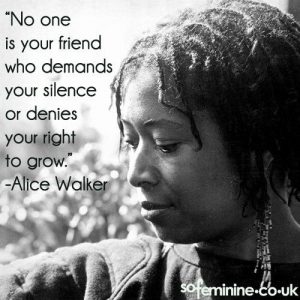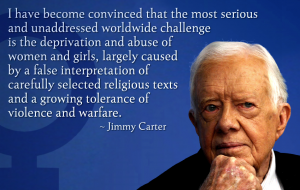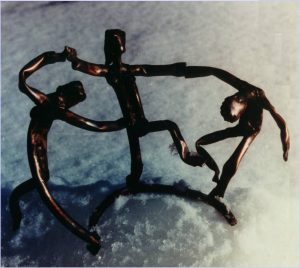
In April 2015, I recorded an interview with Dean Beck on Joy FM. It was part of the Inside Ex-Gay programme produced by Nathan Despott. I was there as someone who had been a Pentecostal minister for many years to reflect on the damage done to LGBTIQ folk who have experienced ex-gay therapy in conservative, evangelical churches. I was also there to apologise for my ignorance and for unwittingly being part of an ideology and practice that created so much pain and death. When the interview aired, some sections of conservative Christians world imploded like the bird on Shrek.
I received my fair share of fury. My partner did too. His, however, came in a different manner. He was criticised for not ‘controlling’ his wife. Surely, he should be able to ‘get her into order’ and have her ‘submit’ to him. Unfortunately, this sort of aggressive rhetoric did not just come from extremist fundamentalist groups, but also from people who should know better – from those who have observed the carnage left in the wake of such ideas. It brings to light an ideology that feeds the modus operandi of some religious institutions: a deeply embedded patriarchal misogyny disguised in religious piety.
Where did this idea, that when a woman in some Christian settings differs from her partner he needs to put her ‘in order’, come from? More importantly, how has this mindset outworked itself in organised religion, culture and society? Patriarchy has ‘worked’ because it has been economical. It also has to keep evolving in order to convince a new generation of its benefits. One of the ways it continues to be upheld in many modern church contexts is through the theology of ‘headship’ (a rather sloppy theology … but I get ahead of myself!) Headship theology has been around for over four decades. Some of the ideas surrounding it came from the controversial Presbyterian minister R.J. Rushdoony, in the 1960s, and was popularised by disgraced, Wheaton College professor Bill Gothard, who argued that it was “God’s chain of command”, in his famous Institute of Basic Life Principles.
Headship theology, part of Rushdoony’s Reconstructionist Theology, was devoured by conservative churches and Christian family groups as ‘sound theology’. It spawned endless amounts of books, video ‘teaching’, and seminars that continue to be popular in many churches to this day. Many of these groups are convinced that society is facing a cultural crisis based on the rejection of a biblical understanding of family, marriage and sex. It also serves their political views and aspirations. Their interpretation of the Bible, of course, is presented as ‘sound doctrine’ and who wants to question assumptions that are rendered as “God’s idea and that are not open for human re-negotiation or revision”? Well, actually, there are quite a few who want to question this paradigm and interpretation – including me. It is time to question. It is time expose some of the underbelly of this dangerous teaching.

Christian conservative fundamentalists espouse patriarchy when they declare that wives must submit to their husbands. This practice and paradigm has greatly contributed to the abuse of women. The recent Mark Driscoll saga is a good example of such. Some argue that most evangelicals practice a ‘soft patriarchy’, which de-emphasises male authority and defines male ‘headship’ in terms of ‘loving sacrificial service to one’s family’ and that the abusive rhetoric like that of Mark Driscoll or John Piper is simply ‘hyper-headship’. Cynthia Ezell counters this with: “Patriarchy is not responsible for an individual husband’s violent action towards his wife. It does, however, create an environment ripe for abuse … Patriarchal beliefs weaken the marital system so that the deadly virus of violence can gain a stronghold.” In other words, whatever form it takes, patriarchy and headship ideals, create environments more susceptible for abuse.
Feminist historians have compiled a large amount of historical data to demonstrate how patriarchy has provided the foundation for male domination which has often led to abuse. It is evident in ancient cultures, and despite the waves of feminism and endeavours of our modern age, this abuse continues. Church fathers contributed to the dilemma. And to this day we witness its effect on women all around the world. So when an individual or an organisation is motivated from a framework that does not just endorse gender hierarchy, but rather enshrines it as ‘God’s idea’, women face several challenges:
- They may themselves be entrenched in these paradigms based on their own personal desire to ‘please God’.
- Any abuse that may (not will, but MAY) follow has ‘God’ attached to it. Spiritual abuse takes a long time to recognise and a long time to recover from. It is difficult to untangle from an ideology presented as “the will or order of God” for those desperately wanting to serve God.
- Any serious critique or debate of people holding to ‘headship theology’ and patriarchal misogyny will be considered as an ‘attack’. Any debate is silenced with “the Bible is clear” (actually, no it isn’t!) or “She is a feminist” (well, yes, I am – you should be one too).
This blog is written for those of you who are have suffered because, for a myriad of reasons, you have sat under religious authority figures who have used theology to oppress you. I want to acknowledge your pain. Abuse of any form is not okay. It is also to remind people who hold positions of religious influence and ‘authority’, or for marriage partners, that to distort the sacred text and to oppress others in “the name of God” is repulsive. If you are experiencing abuse of any kind, including an ideology enforced upon you disguised as “God wants you to submit”, please find a safe place/person to receive help and support, resource yourself, and begin to detangle from toxic religion.
Beware of manufactured political patriarchal ideas peddled on the religious market, often by well-meaning, zealous folk. It is okay to question. Employ critical thinking in what you are being told to believe. You have one short life to live, dear friend. If you have a faith – may that faith bring you joy, freedom, grace and love.
There is neither Jew nor Gentile, neither slave nor free, nor is there male and female, for you are all one in Christ Jesus. Galatians 3:28
Epilogue: For those wondering … my partner and I are very comfortable holding differences. We see it as part of human relationship. We are partners in life, so of course we will discuss anything that impacts our lives – including a radio interview. Sorry to disappoint the detractors.

Hello Nicole
David Orton here. I’ve had the pleasure of rubbing shoulders with Mark many years back.
I applaud your quest for authenticity and freedom from toxic religion. One which we share, although our path is somewhat different. My own daughter’s story is along this line, having fled church in her teens, but only to find God in the midst of her Brunswick alternative lifestyle. You can read her brief story here: http://lifemessenger.org/?page_id=731
However, the very people you have targeted in one of your pieces are the very writers and thinkers that have spoken to her most meaningfully in her own quest, demonstrating the intellectual coherence of faith. I’m sure you are also committed to intellectual honesty in your quest. My encouragement would be to read more deeply in the writings of Rushdoony, Bahnsen, and especially Cornelius Van Til (Bahnsen’s magisterial analysis of Van Til’s epistemology is best if you wish to understand Van Til). Van Til is foundational to Rushdoony. It has been said that Van Til was the equivalent in Christian epistemology as Kant was for philosophical epistemology. The link from your piece on Patriarchy to Rushdoony was a one dimensional caricature, and thus grossly misleading. Patriarchy is another issue which I’m more than happy to chat about. Maybe another occassion.
Would love to sit over a coffee and explore these things with you some time. Please give my greetings to Mark! Its been a long time.
Hi David, Thank you for taking time to comment. Yes, I recall your name from the Howard Carter days (now there’s a discussion on patriarchy). I am familiar with the ideas of the Reformed theologian/apologist, Van Til (systematic theology, total depravity, Scripture alone can answer questions pertaining to morality) and his influence on Rushdoony (and many others that we would both know). I would respectfully suggest that we probably differ on many ideologies and probably also find some common ground. I will pass on your regards to Mark. Thank you again for taking time to comment. Regards, Nicole
I hate church politics. I appreciate your honesty and real talk. Thankyou for posting this.
xxx
Thanks, Cilla.
This is great. Reading it reminded me of the time one of the in laws said almost exactly the same thing about me to my husband – sent an angry text about how I was “out of control.” (His definition of out of control is vastly different to mine!)
I lost count of the times over the years that he made some dramatic statement about how I was ruining the family’s reputation. At the time it was very hurtful. Now I just see him as a petty and cowardly little boy trapped in a man’s body, frightened of anyone different to him and of women who have their own minds. His version of Pentecostal religion is the vehicle he uses to validate his hatred of anyone different to himself.
I desperately hope that churches will improve on this front but I reached the point where I was just too tired to fight anymore. Quitting Pentecostalism was easier than continuing to subject myself to the damaging effects of having my humanity continually questioned because of my gender. I have moved beyond needing to question my own equal humanness, and while I’m still obviously committed to fighting embedded patriarchal social structures around me, it felt suicidal choosing to continue placing myself in a hostile environment.
Thank you so much for sharing, Fi. I so hear you! I think there are many times when we have to go “I can’t fix this” and walk away for our own wellbeing. This really struck a chord: “Quitting Pentecostalism was easier than continuing to subject myself to the damaging effects of having my humanity continually questioned because of my gender.” You are courageous.
Thank you for understanding! I think a lot of my former friends saw it as me losing my faith, where I saw it as an act of self healing and keeping my faith from falling apart!
People are very quick to presume and jump to judgement. I am so glad you had the courage and wisdom to do what you did.
Love your writing Nicole. Your epilogue here, I believe, reflects the greatest contribution you and Mark make to the church – an ability to ‘hold differences’.
Perhaps this is the final frontier of feminism, and indeed any ethical debate, in Christendom. There is too much angry rhetoric and dismissiveness displacing empathy and kindness.
“Let’s sit here in hard truth and easy beauty, in the tensions of the Now and the Not Yet of the Kingdom of God, and let us discover how we can disagree beautifully.”
― Sarah Bessey, Jesus Feminist: An Invitation to Revisit the Bible’s View of Women
Thank you for your kind comment, Marg. I so agree with you in regards to accusatory and dismissive rhetoric where conversations are just instantly shut down. Very sad. And I love the Sarah Bessey quote – how true. Much love to you and yours.
Thanks Nicole, I am constantly challenged by people far smarter than me, with theological knowledge far greater than mine (including you) expressing views that are different to mine and to the “normal” Christian/Church view on any number of subjects.
I have been slow to learn that as you say……
“It is okay to question. Employ critical thinking in what you are being told to believe”.
We are products of our environments – church, family, work, friends with many conflicting views. There are many things I am sure of and many I’m not. An old family friend who died many years ago who I regarded as a spiritual father with knowledge coming out of his ears said “the older I get in the faith the more I realise there is to learn”. Oh that we were all more like that!
Thanks for sharing, Ray. “The older I get in the faith the more I realise there is to learn” – isn’t that the truth for all of us. Leaving behind the ‘certainty’ of the first half of life is one of those terrifying and releasing journeys we can take. Thanks again or your comment.
I very much enjoyed the book ‘Why Not Women?’ which advanced a meaning of ‘head’ in the Greek as ‘source’: as in head waters are the source of the river. Adam being the head of Eve would represent Adam as the source of Eve (as she was taken from his rib) and Christ is referred to as the source of all life. While some would disagree, I just thought that may help others. I do think we have to be careful of assuming an overly negative connotation to the word ‘submission’ as I think it’s clear we are all – both men and women – ‘called’ to submit to one another. Christ submitted himself to the cross and it seems there are some things required of all that are not always feel good experiences. Taking advantage of anyone who makes them self vulnerable is of course an abuse but making ourself vulnerable is par for the course. Thanks for sharing.
Thank you for your comment, Vickie. I would hold to a different view to understanding the creation narrative, that is, how we read it and apply it – Peter Enns’ book: The Evolution of Adam,is a well-argued and engaging book on this matter. I’m not sure about what you mean with ‘but making ourselves vulnerable is part of the course?” I would urge people to practice great caution before making themselves vulnerable to others. Thank you for sharing your thoughts.
Big thank you Nicole! Thank you for the courage, time and effort to articulate a portion of your journey and thereby encourage the likes of me and many others. Very much appreciated!
Thank you, Alida.
When will church’s apologise and compensate for the abuse and damage it has done to individuals. It is easy to speak in abstract terms but I almost lost my life to the effects of institutional abuse. The idea that one should forgive and move on doesn’t help. Intentional and costly apologies must be given for authentic growth both for abusers and abusee to occur.
I think part of the problem is that theology derived from patriarchy is seen as ‘God’s will’ – therefore people operating under it don’t see a problem.